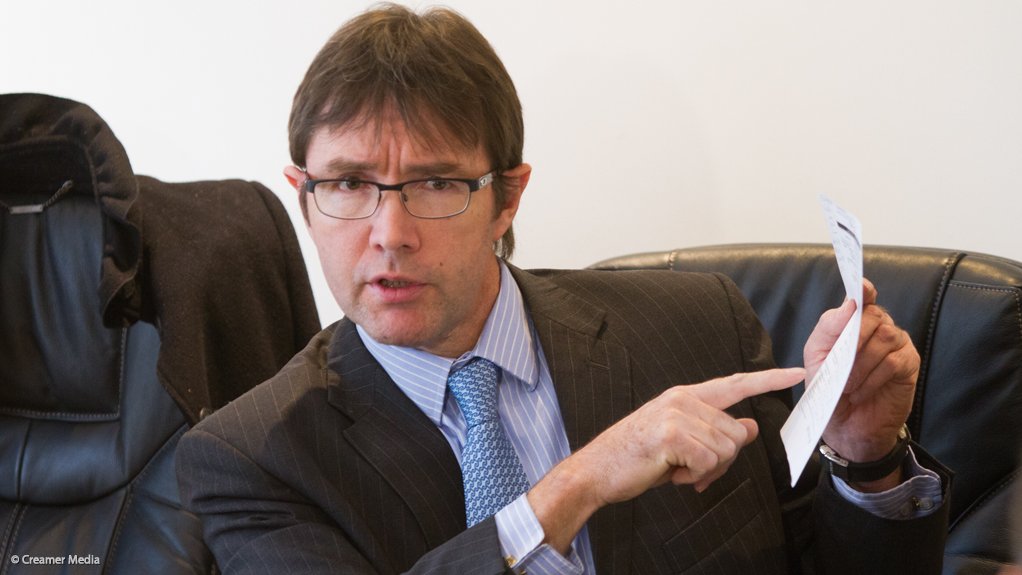Minerals Council reiterates commitment to zero harm goal
The Minerals Council South Africa has recommitted to supporting the mining industry’s shared imperative of zero harm, under the council’s Khumbul’ekhaya strategy.
During a virtual launch of the third iteration of the national day of health and safety, Minerals Council CEO Roger Baxter lamented the outbreak of the Covid-19 pandemic, which has greatly affected the lives of thousands of individuals around the world.
Therefore, in 2020, this national day of health and safety is focused on reinforcing behaviour change at home and at work in the face of the Covid-19 pandemic.
The council also announced the publication of a Behaviour Change Field Guide to reinforce behaviours that support healthy and safe ways of working and community living in the context of Covid-19.
This launch marks the start of initiatives at each mine owned by council members, where messages will be conveyed to managers and employees and, through them, to communities.
Chief Inspector of Mines David Msiza also attended the virtual launch on July 17, where he indicated that the Department of Mineral Resources and Energy (DMRE) had conducted over 1 700 audits and inspections in relation to compliance with Covid-19-related regulations and guidelines.
While the DMRE had found good levels of compliance on the part of large companies, Msiza lamented that some mining companies were still not fully compliant in certain respects.
He called on mining companies to carry out full screenings and requested that they do more than temperature monitoring on employees every day.
Minerals Council CEO Zero Harm Forum chairperson Themba Mkhwanazi, meanwhile, said every mining company has had to focus on Covid-19, “which has been a mammoth task in itself”.
He believes the trends and outcomes so far indicate the effectiveness of the risk assessments and their implementation by health and safety experts and operational management.
Mkhwanazi also drew attention to the Minerals Council’s campaign against sexual and gender-based violence launched in March, and efforts to deal with mental health issues, which have been exacerbated by the pandemic.
In his comprehensive assessment of the situation, Baxter noted that disease incidence rates were improving significantly.
“While there is a lag in the DMRE reporting of health-related performance, the 2018 statistics indicate that key disease rates for the mining sector - which include silicosis, tuberculosis and noise-induced hearing loss - improved by 74%, 63% and 56%, respectively, on the previous year.”
He asserted that these and other improvements could be attributed to “the collaborative and collective efforts of individual companies, Minerals Council programmes, and the efforts of unions, government and tripartite initiatives led by the Mine Health and Safety Council".
Msiza further referred to the number of fatalities for 2020, which currently stand at 23, owing mainly to fall-of-ground and transport-related incidents.
This, Baxter said, was still “too high” as “one fatality is one too many”.
Since 2019, however, Msiza said that there have been improvements in the platinum and coal sectors with regard to health and safety, though the gold sector's health and safety performance had regressed.
South Africa recorded 51 fatalities in the mining sector last year, the lowest ever recorded in the country’s history.
National Union of Mineworkers health and safety head Mziwakhe Nhlapo was still concerned and pointed out that “though there had been one fewer fatality this year compared with the same period last year, many mines had been closed or are operating at lower capacity,” owing to Covid-19-related restrictions.
He urged that research on fall-of-ground and transport-related issues, the two main causes of fatalities this year, be accelerated.
Comments
Press Office
Announcements
What's On
Subscribe to improve your user experience...
Option 1 (equivalent of R125 a month):
Receive a weekly copy of Creamer Media's Engineering News & Mining Weekly magazine
(print copy for those in South Africa and e-magazine for those outside of South Africa)
Receive daily email newsletters
Access to full search results
Access archive of magazine back copies
Access to Projects in Progress
Access to ONE Research Report of your choice in PDF format
Option 2 (equivalent of R375 a month):
All benefits from Option 1
PLUS
Access to Creamer Media's Research Channel Africa for ALL Research Reports, in PDF format, on various industrial and mining sectors
including Electricity; Water; Energy Transition; Hydrogen; Roads, Rail and Ports; Coal; Gold; Platinum; Battery Metals; etc.
Already a subscriber?
Forgotten your password?
Receive weekly copy of Creamer Media's Engineering News & Mining Weekly magazine (print copy for those in South Africa and e-magazine for those outside of South Africa)
➕
Recieve daily email newsletters
➕
Access to full search results
➕
Access archive of magazine back copies
➕
Access to Projects in Progress
➕
Access to ONE Research Report of your choice in PDF format
RESEARCH CHANNEL AFRICA
R4500 (equivalent of R375 a month)
SUBSCRIBEAll benefits from Option 1
➕
Access to Creamer Media's Research Channel Africa for ALL Research Reports on various industrial and mining sectors, in PDF format, including on:
Electricity
➕
Water
➕
Energy Transition
➕
Hydrogen
➕
Roads, Rail and Ports
➕
Coal
➕
Gold
➕
Platinum
➕
Battery Metals
➕
etc.
Receive all benefits from Option 1 or Option 2 delivered to numerous people at your company
➕
Multiple User names and Passwords for simultaneous log-ins
➕
Intranet integration access to all in your organisation



















